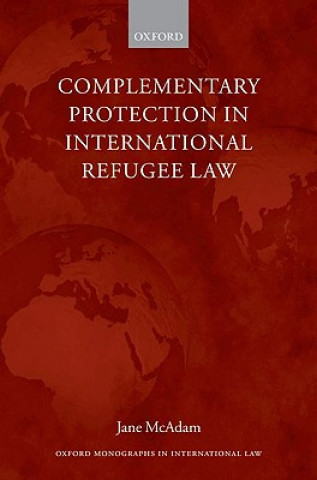
Kód: 04529372
Complementary Protection in International Refugee Law
Autor Jane McAdam
This book represents an exciting new contribution to the field of refugee law and human rights law. It considers the legal obligations which countries have to people who do not meet the legal definition of a 'refugee', but who ha ... celý popis
- Jazyk:
 Angličtina
Angličtina - Vazba: Pevná
- Počet stran: 322
Nakladatelství: Oxford University Press, 2007
- Více informací o knize

Mohlo by se vám také líbit
-

Dolomites
1103 Kč -

Ornamental Design
576 Kč -

Art of Harry Potter
276 Kč -

Microdosing LSD: From Buying to Preparing Your LSD Microdose. Practical Guide for Everyone
323 Kč -

JoJo's Bizarre Adventure: Part 4 - Diamond Is Unbreakable, Vol. 2
442 Kč -

How to Nourish Your Child Through an Eating Disorder
394 Kč -

Lost Boy
268 Kč -

Formula One 2022
463 Kč -

Irving Penn - Centennial
1692 Kč -

Disrupting the Game
544 Kč -

It's Not Luck
419 Kč -

Intermarket Technical Analysis: Trading Strategies Strategies for the Global Stock Bond
2712 Kč -

French Women in Politics: Writing Power
4496 Kč -

Road to Peace
689 Kč -

Gospel of John in Cultural and Rhetorical Perspective
1009 Kč -

Handbook of Exposure Therapies
3456 Kč -

Nature Based Tour & Conservation
4744 Kč -

Play the O'Kelly Sicilian
554 Kč -

You Can Be a Doctor/You Can Be a Pet Vet (Barbie)
494 Kč -

Adaptación Animal
216 Kč -

I Love to Help (Czech English Bilingual Book for Kids)
744 Kč
Darujte tuto knihu ještě dnes
- Objednejte knihu a zvolte Zaslat jako dárek.
- Obratem obdržíte darovací poukaz na knihu, který můžete ihned předat obdarovanému.
- Knihu zašleme na adresu obdarovaného, o nic se nestaráte.
Více informací o knize Complementary Protection in International Refugee Law
Nákupem získáte 419 bodů
 Anotace knihy
Anotace knihy
This book represents an exciting new contribution to the field of refugee law and human rights law. It considers the legal obligations which countries have to people who do not meet the legal definition of a 'refugee', but who have nonetheless been forcibly displaced from their homes, whether due to war, generalized violence, humanitarian disaster or torture, inhuman or degrading treatment or punishment. This is known as 'complementary protection', because it complements the central international instrument in this area, the 1951 Refugee Convention. The book analyses international human rights law to discern where such legal obligations to protect might arise, and considers the legal status which countries ought to provide to such people. It provides a comprehensive overview of States' current responses to this issue, and offers original and thoughtful suggestions for protecting such persons within the international legal framework. This book is the first dedicated study on 'complementary protection' - the protection afforded by States to persons who need international protection but fall outside the legal definition of a refugee in article 1A(2) of the 1951 Refugee Convention. Human rights law has extended States' international protection obligations beyond the Refugee Convention, preventing States from removing individuals who would be at risk of serious harm if returned to their countries of origin. While a number of States have traditionally respected these additional human rights obligations, they have been reluctant to grant beneficiaries a formal legal status analogous to that enjoyed by Convention refugees. This book provides a comprehensive analysis of complementary protection, from its historical development through to its contemporary application. By examining the human rights foundations of the Convention, the architecture of Convention rights, regional examples of complementary protection, and principles of non-discrimination, the book argues that the Convention acts as a type of lex specialis for persons in need of international protection, providing a specialized blueprint for legal status, irrespective of the legal source of the protection obligation. Chapter 1 identifies pre-1951 examples of complementary protection, demonstrating how the content of the status afforded to extended categories of refugees was historically the same as that granted to 'legal' refugees. It traces unsuccessful attempts at the international and European levels to codify a system of complementary protection, prior to the EU's adoption of the Qualification Directive in 2004 and international support for an ExCom Conclusion in 2005. The Qualification Directive, examined in Chapter 2, represents the first supranational codification of complementary protection, but is hampered by a hierarchical conceptualization of protection that grants a lesser status to beneficiaries of 'subsidiary protection' vis-a-vis Convention refugees. Chapters 3 to 5 examine a number of human rights treaties (CAT, ECHR, ICCPR and CRC) to identify provisions which may give rise to a claim for international protection. Finally, Chapter 6 illustrates why all persons protected by the principle of non-refoulement should be entitled to the same legal status as refugees, demonstrating the Refugee Convention's role in providing a rights blueprint for beneficiaries of complementary protection.
 Parametry knihy
Parametry knihy
Zařazení knihy Knihy v angličtině Society & social sciences Society & culture: general Social issues & processes
4190 Kč
- Plný název: Complementary Protection in International Refugee Law
- Autor: Jane McAdam
- Jazyk:
 Angličtina
Angličtina - Vazba: Pevná
- Počet stran: 322
- EAN: 9780199203062
- ISBN: 0199203067
- ID: 04529372
- Nakladatelství: Oxford University Press
- Hmotnost: 610 g
- Rozměry: 241 × 161 × 25 mm
- Datum vydání: 22. February 2007
Oblíbené z jiného soudku
-

The Second Sex
213 Kč -

White Tears Brown Scars
302 Kč -

When Helping Hurts
345 Kč -

The Beauty Myth
181 Kč -

Violence and the Sacred
969 Kč -

Wolf Nation
794 Kč -

Good Immigrant
334 Kč -

Stuart
303 Kč -

Population Wars
409 Kč -

The Lucifer Effect
454 Kč -

Superforecasting
323 Kč -

Sensate Focus in Sex Therapy
1021 Kč -

Pleasure Activism
414 Kč -

Drama Of Being A Child
276 Kč -

Alcoholics Anonymous Big Book
603 Kč -

Vulture
432 Kč -

Regarding the Pain of Others
303 Kč -

Rational Optimist
400 Kč -

Poor Economics
323 Kč -

Violence
323 Kč -

Psychopath Free
412 Kč -

Shock Doctrine
433 Kč -

The Divide
323 Kč -

Silently Seduced
318 Kč -

The Feminine Mystique
290 Kč -

Toxic Parents
357 Kč -

Soft Power
361 Kč -

Third Wave
240 Kč -

Posthuman Feminism
569 Kč -

No Logo
323 Kč -

Courage To Heal Workbook
611 Kč -

Illness as Metaphor and AIDS and Its Metaphors
357 Kč -

Down and Out in Paris and London
250 Kč -

Dopesick
213 Kč -

Presence
369 Kč -

Facing the Shadow
796 Kč -

Last Days at Hot Slit - The Radical Feminism of Andrea Dworkin
440 Kč -

A Room of One's Own
236 Kč -

Future Shock
240 Kč -

Problem that Has No Name
63 Kč -

Your Silence Will Not Protect You
384 Kč -

Social Animal
378 Kč -

Attention Merchants
334 Kč -

Who Cooked Adam Smith's Dinner?
303 Kč -

Stiff Upper Lip
303 Kč -

Power Elite
410 Kč -

Eternal Treblinka
576 Kč -

Critical Race Theory (Third Edition)
584 Kč -

Go Ask Alice
250 Kč
Osobní odběr Praha, Brno a 12903 dalších
Copyright ©2008-24 nejlevnejsi-knihy.cz Všechna práva vyhrazenaSoukromíCookies



 Vrácení do měsíce
Vrácení do měsíce 571 999 099 (8-15.30h)
571 999 099 (8-15.30h)